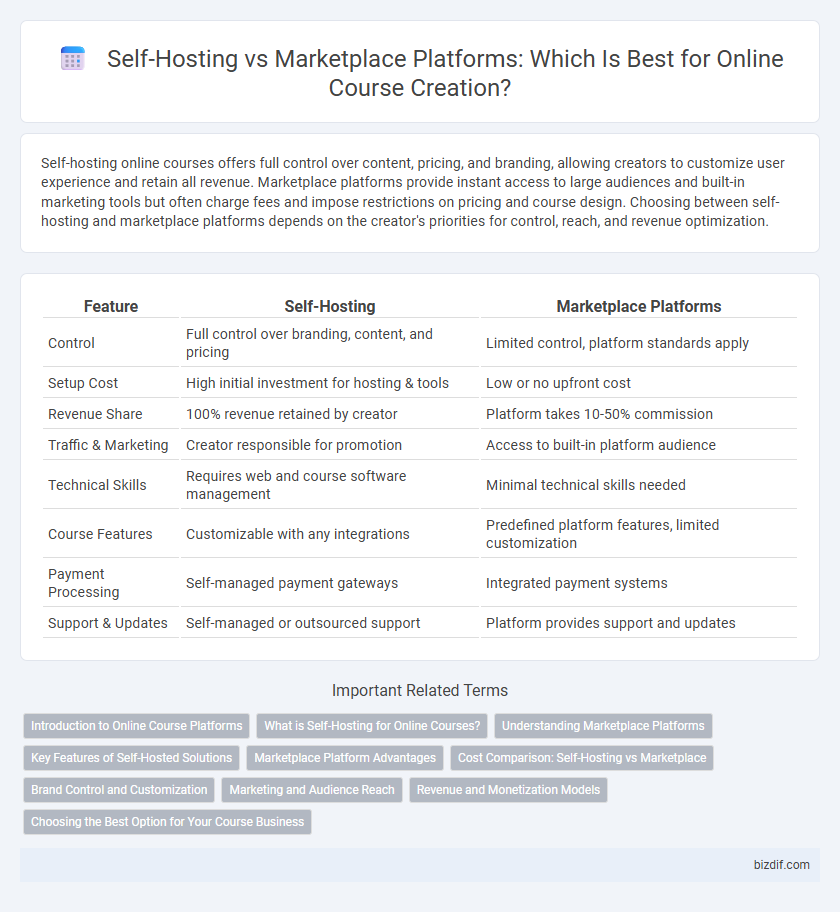Self-hosting online courses offers full control over content, pricing, and branding, allowing creators to customize user experience and retain all revenue. Marketplace platforms provide instant access to large audiences and built-in marketing tools but often charge fees and impose restrictions on pricing and course design. Choosing between self-hosting and marketplace platforms depends on the creator's priorities for control, reach, and revenue optimization.
Table of Comparison
| Feature | Self-Hosting | Marketplace Platforms |
|---|---|---|
| Control | Full control over branding, content, and pricing | Limited control, platform standards apply |
| Setup Cost | High initial investment for hosting & tools | Low or no upfront cost |
| Revenue Share | 100% revenue retained by creator | Platform takes 10-50% commission |
| Traffic & Marketing | Creator responsible for promotion | Access to built-in platform audience |
| Technical Skills | Requires web and course software management | Minimal technical skills needed |
| Course Features | Customizable with any integrations | Predefined platform features, limited customization |
| Payment Processing | Self-managed payment gateways | Integrated payment systems |
| Support & Updates | Self-managed or outsourced support | Platform provides support and updates |
Introduction to Online Course Platforms
Online course platforms provide creators with options for self-hosting or leveraging marketplace platforms, each with distinct benefits. Self-hosting grants full control over branding, pricing, and content management, ideal for entrepreneurs seeking customization and independence. Marketplace platforms offer built-in audiences and marketing tools, streamlining course promotion but often with revenue sharing and platform restrictions.
What is Self-Hosting for Online Courses?
Self-hosting for online courses involves creating and managing your own website or learning management system (LMS) to deliver course content directly to students, offering full control over branding, pricing, and user data. This approach requires technical expertise to handle hosting, payment processing, and security but enables customization without marketplace fees or restrictions. Popular self-hosted LMS options include WordPress with LearnDash, Teachable's self-hosted features, and open-source platforms like Moodle.
Understanding Marketplace Platforms
Marketplace platforms offer a centralized environment where course creators can reach a broad audience without managing website hosting or payment systems. These platforms provide built-in marketing tools, user analytics, and community features to enhance engagement and sales potential. However, creators often face revenue sharing models and limited customization options compared to self-hosted solutions.
Key Features of Self-Hosted Solutions
Self-hosted online course platforms offer full control over branding, course content, and user data security, enabling customization tailored to specific educational needs. They support flexible payment gateways, integrate seamlessly with marketing and CRM tools, and provide advanced analytics for detailed student performance tracking. Unlike marketplace platforms, self-hosted solutions eliminate revenue sharing, allowing creators to retain 100% of their income and foster direct relationships with learners.
Marketplace Platform Advantages
Marketplace platforms provide built-in audiences, boosting course visibility and enrollment without extensive marketing efforts. These platforms handle payment processing, content hosting, and customer support, reducing technical and administrative burdens for creators. Access to analytics and promotional tools on marketplaces enables data-driven improvements and higher revenue potential.
Cost Comparison: Self-Hosting vs Marketplace
Self-hosting an online course involves higher upfront costs, including website development, hosting fees, and payment processing, but offers greater control over pricing and revenue. Marketplace platforms typically charge lower initial fees but take significant commission percentages on sales, reducing overall profit margins. Evaluating expected sales volume and long-term goals is essential for determining whether self-hosting or marketplace platforms provide a more cost-effective solution.
Brand Control and Customization
Self-hosting online courses grants complete brand control, allowing creators to customize every aspect of their platform, from design elements to user experience, ensuring a consistent and unique brand identity. Marketplace platforms limit customization options and often display competing courses alongside, which can dilute individual branding and reduce differentiation. Prioritizing self-hosting boosts brand authority and enables tailored marketing strategies directly aligned with the creator's vision.
Marketing and Audience Reach
Self-hosting online courses offers full control over branding, pricing, and customer data, enabling tailored marketing strategies but requiring significant effort to build and maintain audience reach. Marketplace platforms like Udemy and Coursera provide instant access to large, engaged audiences and built-in marketing tools, accelerating course discoverability and enrollment. Choosing between self-hosting and marketplaces depends on balancing control with the desire for broader exposure and reduced promotional workload.
Revenue and Monetization Models
Self-hosting online courses allows creators to capture 100% of revenue while offering flexible monetization options like subscriptions, pay-per-course, and tiered memberships. Marketplace platforms typically charge commission fees ranging from 20% to 50%, reducing net earnings but providing greater exposure and built-in marketing tools. Monetization on marketplaces is often limited to fixed pricing models, whereas self-hosted courses enable dynamic pricing, bundled offerings, and personalized discounting strategies.
Choosing the Best Option for Your Course Business
Self-hosting an online course offers complete control over branding, pricing, and user experience, making it ideal for businesses seeking full customization and ownership of their content. Marketplace platforms provide built-in audiences and simplified marketing tools, which can accelerate enrollment but often involve revenue sharing and less control over course presentation. Evaluate your budget, marketing skills, and desired level of autonomy to determine whether self-hosting platforms like Teachable or Thinkific, or marketplaces such as Udemy and Skillshare, better align with your course business goals.
Self-hosting vs Marketplace Platforms Infographic

 bizdif.com
bizdif.com